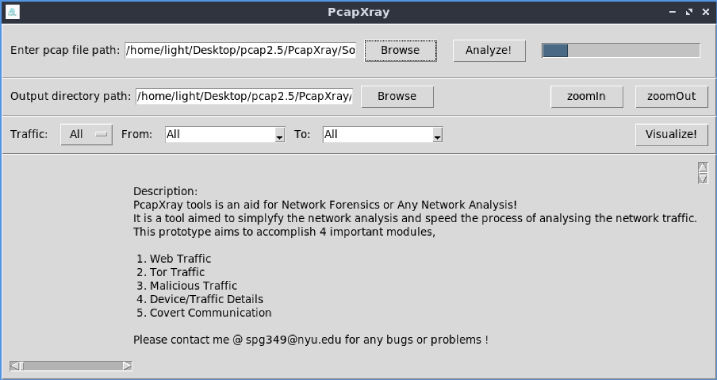PcapXray is a Network Forensics Tool to visualize a Packet Capture offline as a Network Diagram including device identification, highlight important communication and file extraction.
PcapXray Design Specification
Goal:
Given a Pcap File, plot a network diagram displaying hosts in the network, network traffic, highlight important traffic and Tor traffic as well as potential malicious traffic including data involved in the communication.
Problem:
- Investigation of a Pcap file takes a long time given initial glitch to start the investigation
- Faced by every forensics investigator and anyone who is analyzing the network
- Location: https://github.com/Srinivas11789/PcapXray
Solution: Speed up the investigation process
- Make a network diagram with the following features from a Pcap file Tool Highlights:
- Network Diagram – Summary Network Diagram of full network
- Information:
- Web Traffic with Server Details
- Tor Traffic
- Possible Malicious traffic
- Data Obtained from Packet in Report – Device/Traffic/Payloads
- Device Details
Also Read – Brutality : A Fuzzer For Any GET Entries
Tool Image


Components
- Network Diagram
- Device/Traffic Details and Analysis
- Malicious Traffic Identification
- Tor Traffic
- GUI – a gui with options to upload pcap file and display the network diagram
Setup
- Python 3
apt install python3-pip
apt install python3-tk
apt install graphviz
apt install python3-pil
python3-pil.imagetk
pip3 install -r requirements.txt
python3 Source/main.py
( Make sure to escalate privilege to allow file creations – Run with sudo )
- Python 2
apt install python-tk
apt install graphviz
pip install -r requirements.txt
python Source/main.py
( Make sure to escalate privilege to allow file creations – Run with sudo )
Python Libraries Used: – All these libraries are required for functionality
- Tkinter and TTK – Install from pip or apt-get – Ensure Tkinter and graphviz is installed (Most Linux contain by default)
- apt install python-tk
- apt install graphviz
- apt install python3-tk (for python3 support)
- Sometimes ImageTk errors are thrown in python3 env –> use apt install python3-pil python3-pil.imagetk
- All these are included in the requirements.txt file
- Scapy – rdpcap to read the packets from the pcap file
- Ipwhois – to obtain whois information from ip
- Netaddr – to check ip information type
- Pillow – image processing library
- Stem – tor consensus data fetch library
- pyGraphviz – plot graph
- Networkx – plot graph
- Matplotlib – plot graph (not used as of now)
Getting Started
- Clone the repository
- pip install -r requirements.txt
- python Source/main.py
Additional Information
- Tested on Linux
- Options for Traffic include – Web (HTTP and HTTPS), Tor, Malicious, ICMP, DNS
Challenges
- Unstability of the TK GUI:
- Decision on the GUI between Django and TK, settled upon tk for a simple local interface, but the unstability of the tk gui caused a number of problems
- Graph Plotting:
- Plotting a proper network graph which is readable from the data obtained was quite an effort, used different libraries to arrive at one.
- Performance and Timing:
- The performance and timing of the total application was a big challenge with different data gathering and output generation
Known Bugs
- Memory Hogging
- Sometimes memory hogging occurs when lower RAM is present in the system as the data stored in the memory from the pcap file is huge
- Should be Fixed by moving data into a database than the memory itself
- Race Condition
- Due to mainloop of the TK gui, other threads could undergo a race condition
- Should be fixed by moving to a better structured TK implementation or Web GUI
- Tk GUI Unstability:
- Same reason as above
- Code:
- clumsy and unstructured code flow
- Current Fix in rare occasions: If any of the above issue occurs the progress bar keeps running and no output is generated, a restart of the app would be required.
Docker Containers of PcapXray
- Dockerfile present in the root folder was used to build images
- Already built docker images are found at dockerhub
- srinivas11789/pcapxray-1.0
- srinivas11789/pcapxray-2.2
- Performing the steps in
run.shfile manually would work to launch the tool via docker (I can help with errors) - Running
run.shscripts is an attempt to automate (would not work 100 percent)- tested on mac and linux – will be better soon!…
PcapXray 2.0
- Includes zoom feature
- Improves usability with a Browse files feature
- Report directory fixes for graph images
- Includes some bug fixes
Immediate Future Tasks: (Target: 3.0)
- Clean up code (beautify code base from being a prototype)
- Report generation on unique folders for all assets of a packet capture
- Suspicious activity detection
- Support more pcap reader engine
- Traffic support: ICMP, DNS
- Known file type detection and Extract
- Python2 and Python3
Future
- Structured and clean code flow
- Change the database from JSON to sqlite or prominent database, due to memory hogging
- Change fronend to web based such as Django
- Make the application more stable
- More protocol support
- Clean up code









